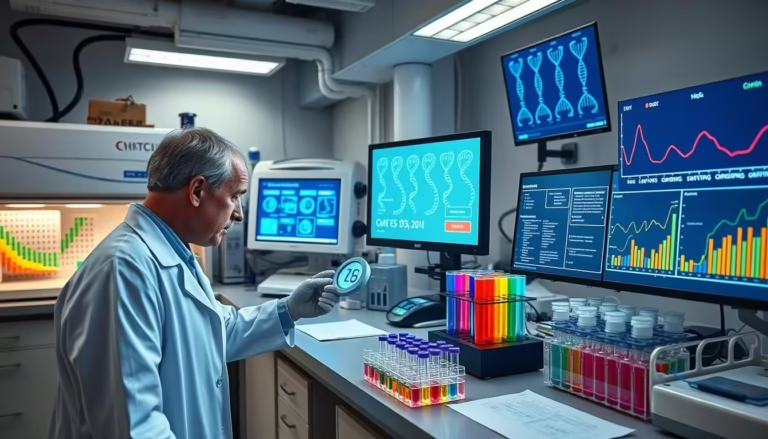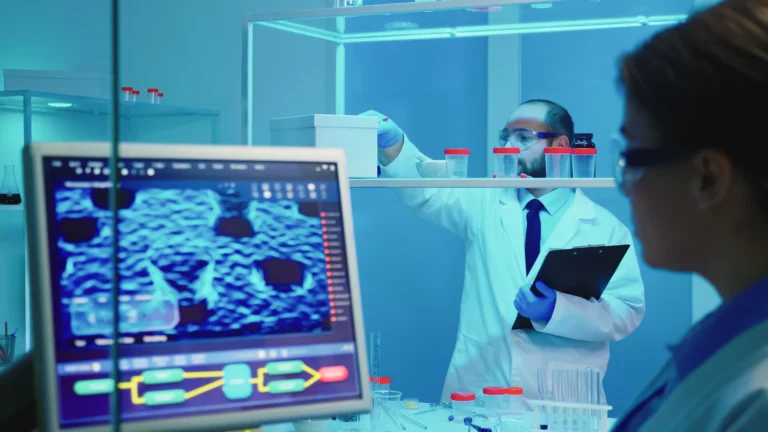Can Pharmacogenomics Effectively Combat Antimicrobial Resistance?
Did you know that without urgent action, antibiotic resistance could lead to over 10 million deaths annually? This alarming figure highlights the global public health crisis posed by antimicrobial resistance (AMR). As bacteria evolve and adapt, the effectiveness of common antibiotics diminishes, leaving healthcare providers scrambling for alternatives. One promising solution lies in pharmacogenomics, a field that explores how an individual’s genetic makeup influences their response to medications. The potential of pharmacogenomics and antimicrobial resistance in tailoring antibiotic treatments based on genetic factors could revolutionize the way we approach infections, enhancing treatment efficacy while minimizing adverse reactions.
By integrating pharmacogenomics into healthcare, we may be able to significantly curb the rise of resistant strains, addressing an urgent need in medical science. Innovations in this area could not only lead to more effective treatments but also pave the way for personalized medicine strategies that optimize patient outcomes. For further details, you can explore the insights provided in this article about the intersection of pharmacogenomics and AMR here1. Let’s find out… can pharmacogenomics effectively combat antimicrobial resistance?

Understanding Antimicrobial Resistance (AMR)
Antimicrobial resistance (AMR) is a critical public health crisis, arising from microorganisms’ resistance to medications like antibiotics. The WHO forecasts that annually, at least 700,000 deaths are attributable to AMR, with a potential surge to 10 million by 2050 if countermeasures are not undertaken2. The overprescription and misuse of antimicrobials have exacerbated this crisis, leading to extended hospital stays and significantly elevated medical expenses. These developments threaten the efficacy of treatments for infections that were once manageable2.
The intricacies of drug resistance mechanisms are multifaceted. Resistance mutations are pivotal, as bacteria have evolved through various strategies. These include limiting drug access, modifying drug targets, and neutralizing drugs3. For example, Methicillin-Resistant Staphylococcus aureus (MRSA) has become a global concern, while Extended-Spectrum Beta-Lactamase (ESBL)-Producing Enterobacteriaceae, including Escherichia coli and Klebsiella pneumoniae, are on the rise2.
The economic impact of AMR is equally alarming, with projected annual costs ranging from tens to hundreds of billions of dollars2. The dwindling discovery of new antimicrobial drugs, due to low profitability and shifting pharmaceutical industry priorities, exacerbates the crisis, leaving a sparse pipeline for future treatments3. The interplay between resistance mutations and AMR complicates treatment strategies and highlights the imperative for comprehensive solutions to this escalating challenge2.
What is Pharmacogenomics?
Pharmacogenomics is a pioneering field that harmonizes pharmacology and genomics to revolutionize patient care. It leverages genetic insights to forecast individual responses to medications. This approach allows clinicians to tailor drug treatments to specific genetic profiles, thereby enhancing the efficacy of therapy.
Advances in genetic testing empower healthcare professionals to refine drug therapy, thereby boosting treatment outcomes and reducing adverse reactions. Genetic variations in genes such as CYP2A6, CYP2B6, and UGT1A9 significantly influence responses to antimalarial drugs like artesunate-mefloquine4.
Furthermore, genetic variants like CYP2B6*6 are linked to increased efavirenz levels in patients, a critical antiretroviral agent for HIV treatment4. Pharmacogenomics also predicts the likelihood of severe reactions to antimicrobials, thus improving patient outcomes5.
This discipline is transforming the drug discovery process by pinpointing genetic determinants of metabolism. This not only reduces development costs and timelines but also enhances personalized therapies for diverse patient groups, including those from African, Asian, and European backgrounds4.
In practical applications, pharmacogenomics has shown significant impact in clinical settings. For instance, whole genome sequencing has been instrumental in predicting antimicrobial susceptibility in tuberculosis, significantly shortening diagnosis time to under a week5. Ongoing advancements in genomic medicine promise to further refine medication regimens over the next two decades, with pharmacy teams at the forefront of this evolution5.
As pharmacogenomics continues to advance, it marks a paradigm shift in medication prescription and administration. This evolution is set to significantly improve patient care and health outcomes.
The Role of Genetics in Combating Antimicrobial Resistance
Genetics is paramount in the realm of antimicrobial resistance, dictating individual responses to antibiotics. Certain genetic variants significantly impact drug efficacy and metabolic processes, underscoring the necessity of identifying these variants in clinical environments. The alarming projection that global deaths from antimicrobial resistance could surge to 10 million by 2050, absent preventive actions, underscores the critical need for effective countermeasures6.
The escalating incidence of multidrug-resistant pathogens necessitates genetic research for the development of targeted therapies. These therapies must be predicated on patients’ genetic profiles. A stark example is the 12% of children admitted to Dr. Hasan Sadikin General Hospital in Indonesia, afflicted with multidrug-resistant infections, highlighting genetic influences on antimicrobial resistance7.
Advancements in technologies such as whole-genome sequencing are pivotal in deciphering resistance patterns, enabling healthcare professionals to craft bespoke treatment strategies. Such methodologies not only refine the prediction of drug efficacy but also diminish the risks linked to antimicrobial resistance, aligning with the burgeoning trend of personalized medicine.
Integrating genetic insights into therapeutic decisions could serve as a linchpin in the fight against escalating resistance. This personalization is imperative as healthcare systems grapple with the repercussions of antibiotic overuse and misuse, resulting in prolonged illnesses and escalating healthcare expenditures6.
A comprehensive strategy, encompassing CRISPR/Cas9 technology and the exploration of plant-derived compounds, is gaining traction in combating antimicrobial resistance. By delving into genetics and antimicrobial resistance, we can unravel the complexities of drug susceptibility, heralding innovative treatment paradigms for the future.
Can Pharmacogenomics Effectively Combat Antimicrobial Resistance?
The escalating challenge of antimicrobial resistance (AMR) necessitates the exploration of innovative solutions, with pharmacogenomics standing out as a potential game-changer. This field leverages genetic insights to craft antibiotic prescriptions that resonate with each patient’s genetic blueprint. Such an approach is imperative, given the alarming rise of multidrug-resistant organisms (MDROs), including methicillin-resistant Staphylococcus aureus (MRSA) and vancomycin-resistant Enterococci species, which pose substantial threats to public health8.
Exploring Individualized Treatment Strategies
Adopting individualized treatment strategies not only tailors medicine for the unique challenges of AMR but also significantly boosts therapeutic outcomes. By matching antibiotic choices with a patient’s genetic profile, healthcare professionals can mitigate the risk of resistance escalation. This precision in antimicrobial resistance leads to improved patient outcomes, as evidenced by a decline in infections caused by drug-resistant pathogens9.
Potential Benefits of Precision Medicine
The advantages of precision medicine transcend individual patient care, influencing public health on a broader scale. By optimizing antibiotic therapies through pharmacogenomic insights, we can drastically reduce healthcare expenditures and combat the escalating trends in AMR. The staggering global death toll of 1.27 million attributed to antimicrobial resistance in 2019 underscores the urgency for effective treatment strategies8. Through the judicious integration of pharmacogenomics, we can significantly diminish these figures, ushering in a new era of antimicrobial treatment.
The Impact of Pharmacogenomics on Antimicrobial Resistance
Pharmacogenomics is revolutionizing the management of drug resistance by aligning antibiotic therapies with patients’ genetic profiles. This precision approach enhances treatment efficacy, thereby diminishing the misuse of antimicrobials. Such targeted interventions are pivotal in combating antimicrobial resistance (AMR), ensuring that patients receive optimal medication at the right time.
In the European Union, the European Commission estimates that AMR-related fatalities total around 33,000 annually, with healthcare expenditures reaching approximately €1.5 billion10. The United States, according to the Centers for Disease Control and Prevention, experiences over 2.8 million AMR cases yearly, leading to more than 35,000 deaths10. The rise of carbapenem resistance, necessitating the use of “last-resort” antibiotics, underscores the urgency of this issue10.
Addressing drug resistance effectively demands vigilant antibiotic stewardship, alongside the discovery of novel targets and the reconfiguration of existing antibiotics. Collaborative research has identified antibiotic combinations that could potentially extend the lifespan of last-resort medications10. Such initiatives are crucial in countering the global threat posed by AMR.
Pharmaceutical entities face significant regulatory hurdles that deter the development of new antibiotics, thereby diminishing investment. Enhancing public awareness and education on vaccinations is essential in combating AMR’s broad impact on patient health and healthcare systems11.
| Year | AMR Cases (US) | AMR Deaths (EU) | Healthcare Costs (EU) |
|---|---|---|---|
| 2019 | 2.8 million | 33,000 | €1.5 billion |
Current Trends in Precision Medicine for AMR
Recent advances reveal significant current trends in precision medicine aimed at combating antimicrobial resistance (AMR). The advent of novel molecular diagnostics has revolutionized the identification of resistance genes, enabling swift and targeted interventions. These diagnostics are crucial, as they can identify specific antibiotic resistances crucial for effective treatment strategies against resistant infections.
The realm of advancements in pharmacogenomics is witnessing the exploration of combinatorial therapies to counteract AMR. Such therapies are becoming increasingly necessary as multi-drug-resistant pathogens proliferate. Indeed, the potential for global deaths due to AMR could reach 10 million by 2050 if preventative actions are not implemented6. This dire prediction underscores the imperative for innovative, personalized medicine approaches, which could markedly enhance patient outcomes in the face of resistant infections.
Antimicrobial resistance has not only escalated in frequency but also demonstrated a notable resistance to various antimicrobial agents. This necessitates enhanced collaboration through data sharing and research partnerships at both national and international levels6. The integration of high-throughput sequencing and rapid phenotyping is becoming indispensable for a deeper understanding of pathogen resistance patterns, facilitating more informed therapeutic decisions.
Furthermore, the significance of AMR surveillance has been recognized as a vital methodology to comprehend and track resistance trends effectively. Surveillance mechanisms, bolstered by computational approaches, enhance the monitoring of resistance genes and their spread across populations within healthcare settings, underscoring the ongoing struggle against AMR.

| Trend | Description | Impact on AMR |
|---|---|---|
| Molecular Diagnostics | Rapid identification of resistance genes. | Facilitates timely intervention and improves treatment outcomes. |
| Combinatorial Therapies | Exploration of combinations of different antibiotics. | Aims to tackle multi-drug-resistant pathogens effectively. |
| High-Throughput Sequencing | Advanced methods for pathogen resistance pattern analysis. | Enhances understanding of resistance mechanisms. |
| AMR Surveillance | Monitoring trends of antimicrobial resistance. | Enables informed decision-making for treatment. |
The pressing need to address these current trends in precision medicine underscores the importance of education and awareness in the fight against antimicrobial resistance. The medical community’s efforts to overcome these challenges are critical.
In the burgeoning field of pharmacogenomics, these innovations promise to tailor therapies to individual patient needs, potentially reducing hospital-acquired infections and enhancing global health outcomes.
Challenges in Implementing Pharmacogenomics in Low and Middle-Income Countries
The integration of pharmacogenomics within low and middle-income countries encounters significant hurdles, notably in access to molecular diagnostics and the training of healthcare professionals. These challenges hinder the implementation of personalized medicine, which is crucial for enhancing therapeutic outcomes.
Access to Molecular Diagnostics
Scarcity of resources hampers the availability of molecular diagnostics, essential for tailoring treatment plans. This deficiency exacerbates health challenges in these regions, underscoring the need for robust healthcare infrastructure. Research underscores the urgency to bridge these gaps for pharmacogenomics implementation12. Enhancing *molecular diagnostics access* is vital for improving health outcomes and mitigating health disparities in low and middle-income areas.
Knowledge Gaps Among Healthcare Professionals
Insufficient healthcare professionals training is evident, with studies showing a mere 38% of practitioners possessing adequate pharmacogenetics knowledge13. This deficiency not only limits pharmacogenomics application but also perpetuates the challenges in pharmacogenomics necessary for disease management. It necessitates the establishment of comprehensive educational programs and continuous professional development initiatives14. Addressing these knowledge gaps will propel the integration of pharmacogenomics, thereby enhancing patient management strategies.
Future Perspectives: Pharmacogenomics and Antimicrobial Resistance
The future of pharmacogenomics is poised to revolutionize the fight against antimicrobial resistance (AMR). As genetic testing becomes integral to clinical practice, it heralds a new era of personalized medicine. This shift will enable the creation of tailored treatments aligned with individual genetic profiles, potentially curbing the rise of AMR and enhancing global health outcomes.
Emerging technologies, such as bacteriophages and antimicrobial peptides, are being explored for their potential to combat drug-resistant pathogens while preserving beneficial microbiota. These innovations, when integrated into pharmacogenomic frameworks, enhance current therapeutic options. They underscore the effectiveness and diversity of antimicrobial resistance solutions. Genetic insights are now central to guiding antibiotic use and preventing resistance development.
The synergy between pharmacogenomics and innovative treatments marks a pivotal moment in the management of AMR. Through collaboration among genetics, microbiology, and clinical fields, a comprehensive strategy can be developed. This strategy aims to preserve antibiotic efficacy and elevate patient care standards. The relentless advancement of personalized medicine advances is essential for equipping future generations with effective strategies against AMR15117. For more great articles see our full blog.
Source Links
- https://www.ncbi.nlm.nih.gov/pmc/articles/PMC9405321/ – Antimicrobial Resistance and Its Spread Is a Global Threat
- https://www.sciencedirect.com/science/article/pii/S1876162323000937 – Uncovering the secrets of resistance: An introduction to computational methods in infectious disease research
- https://www.frontiersin.org/journals/pharmacology/articles/10.3389/fphar.2024.1347750/full – Frontiers | Combating antimicrobial resistance: the silent war
- https://www.ncbi.nlm.nih.gov/pmc/articles/PMC4296903/ – Pharmacogenomics of antimicrobial agents
- https://www.rpharms.com/resources/pharmacy-guides/antimicrobial-resistance-and-stewardship-resources/ams-and-pgx – AMS and PGx
- https://www.biorxiv.org/content/biorxiv/early/2024/06/27/2024.06.22.600223.full.pdf – An Automated Machine Learning Framework for Antimicrobial Resistance Prediction Through Transcriptomics
- https://www.jptcp.com/index.php/jptcp/article/view/5861 – Journal of Population Therapeutics and Clinical Pharmacology
- https://www.frontiersin.org/journals/pharmacology/articles/10.3389/fphar.2023.1295623/full – Frontiers | Editorial: New drugs, approaches, and strategies to combat antimicrobial resistance
- https://www.nature.com/articles/d42473-019-00172-x – A CRISPR approach to pharmacogenomics
- https://www.mdpi.com/2079-6382/11/8/1082 – Antimicrobial Resistance and Its Spread Is a Global Threat
- https://www.nature.com/articles/s41392-023-01619-w – Drug-microbiota interactions: an emerging priority for precision medicine – Signal Transduction and Targeted Therapy
- https://www.cambridge.org/core/journals/global-health-epidemiology-and-genomics/article/disease-burden-and-the-role-of-pharmacogenomics-in-african-populations/10431D5F29E2A99AEADF6DE159A2B3BA – Disease burden and the role of pharmacogenomics in African populations | Global Health, Epidemiology and Genomics | Cambridge Core
- https://www.ncbi.nlm.nih.gov/pmc/articles/PMC7835886/ – Healthcare Professionals’ Knowledge of Pharmacogenetics and Attitudes Towards Antimicrobial Utilization in Zambia: Implications for a Precision Medicine Approach to Reducing Antimicrobial Resistance
- https://www.mdpi.com/1999-4923/16/3/332 – Advancing Precision Medicine: A Review of Innovative In Silico Approaches for Drug Development, Clinical Pharmacology and Personalized Healthcare
- https://typeset.io/questions/what-are-the-future-perspectives-of-antibiotics-in-medicine-3k8upv0pif – What are the future perspectives of antibiotics in medicine? | 5 Answers from Research papers






